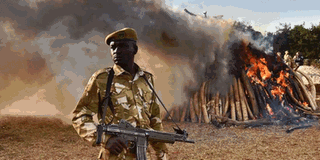Why ivory without elephants is worthless

A Kenya Wildlife Service ranger stands near a burning pile of 15 tonnes of elephant ivory seized in Kenya at Nairobi National Park on March 3, 2015. Ivory means death; death for our elephants, our God-given heritage, and our tourism sector. Ivory also means illicit funding of terrorist activities in parts of the African continent. We all have to do everything within our power to stop poaching and trade in ivory. AFP PHOTO | CARL DE SOUZA |
What you need to know:
- On Saturday, I will set ablaze more than 100 tonnes of ivory. It will be a pleasure to burn it and do my part to destroy any possibility that poachers and their accomplices might benefit from the slaughter of Kenya’s elephants.
- Ivory means death; death for our elephants, our God-given heritage, and our tourism sector.
- Ivory also means illicit funding of terrorist activities in parts of the African continent.
- We all have to do everything within our power to stop poaching and trade in ivory.
On Saturday, I will set ablaze more than 100 tonnes of ivory. It will be a pleasure to burn it and do my part to destroy any possibility that poachers and their accomplices might benefit from the slaughter of Kenya’s elephants.
I do not need to tell you that our elephants are perhaps the most striking part of our continent’s natural heritage, that they show great intelligence and emotion, or that they live in large, graceful families.
But I do have to emphasise the dangers they now face: Across Africa and in the past decade or so, the herds have been besieged by a new generation of poachers, who are armed with new weapons and connected to vast new markets across the world.
The results have been catastrophic: there are probably half as many elephants in Africa today as there were a decade ago.
If that does not change, our children will be the first Africans in 10,000 years to grow up in a continent without these beautiful animals.
RENEWED HOPE
As it happens, East Africa has been spared some of the worst ravages of the poachers and there is evidence from the Convention on International Trade in Endangered Species of Wild Fauna and Flora that our elephant populations are slowly getting back to where they belong: 2015 was the fourth consecutive year in which more elephants were born than were killed in this region.
We can look away and wait for the African elephant to follow the Cape lion into extinction or we can act now and be the generation of Africans that secures our elephants once and for all.
If we choose to act, we will find that we are not alone. Common problems call for common approaches and, with the help of foreign friends and partners and other African heads of State, it is my pleasure to host this week’s Giant’s Club Summit. Together, we will do everything we can to end poaching.
But let me also be perfectly clear: what we do at these summits will be in line with our own very aggressive strategy.
We impose some of the toughest penalties anywhere on earth for wildlife and natural heritage crimes.
We have also made it clear that we do not believe that ivory is an acceptable commodity for trade. That position is backed by the recent history of attempts to trade ivory.
In 2008, as an experiment and to allow for the disposal of ivory stocks held by four countries in southern Africa, the trade in ivory was resumed after a long ban.
These sales, in our view, simply intensified the illegal trade and hampered the effort to conserve the African elephant.
BETTER BET
The better bet is an approach combining aggressive law enforcement, effective control over the movement of ivory, and an attack on the incentives to market it.
And that is where the burning tomorrow comes in. No one would be surprised if I said I was going to burn illegal drugs: everyone knows that whatever the price they would fetch if sold, they should not be sold.
Everyone can see the same point about the illicit brew that has done so much harm to Kenyans.
And yet, when it comes to the trade in ivory - which is destroying our wildlife and funding some of the most extreme violence on the continent - some fail to see that the ivory should also be destroyed.
Ivory means death; death for our elephants, our God-given heritage, and our tourism sector.
Ivory also means illicit funding of terrorist activities in parts of the African continent.
We all have to do everything within our power to stop poaching and trade in ivory.
Mr Kenyatta is the President of the Republic of Kenya.





